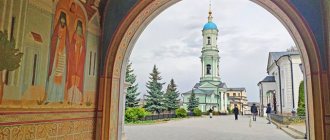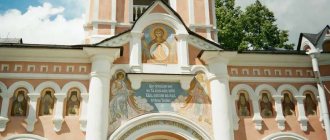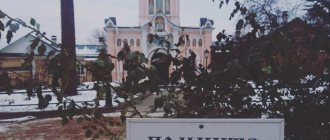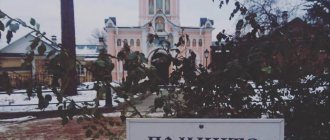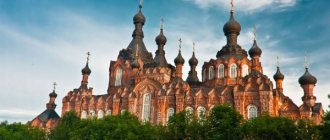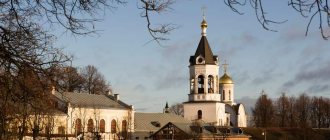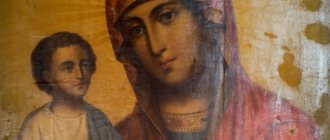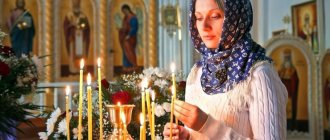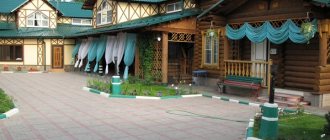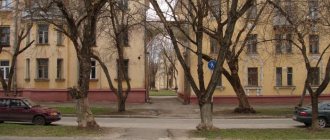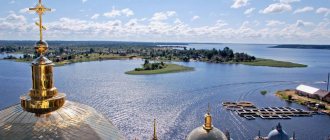Archimandrite Melchizedek (Artyukhin)
Optina Pustyn occupies a special place in our spiritual culture. About the phenomenon of this monastery, about its elders, their covenants and lessons - our conversation with one of the first inhabitants of the Optina Hermitage revived in 1988, the rector of its Moscow courtyard - the Church of the Holy Apostles Peter and Paul in Yasenevo, press secretary of the Synodal Department for Monasteries and Monasticism Archimandrite Melchizedek (Artyukhin).
Brotherhood of Saints
Father Melchizedek, why exactly here, in the Optina Hermitage, did the phenomenon of old age arise? What is unique about this monastery?
About Optina Hermitage, historian G.P. Fedotov once said that Sarov and Optina Pustyn were the two hottest fires around which all of Russia warmed itself. Elder Barsanuphius of Optina, a former colonel of the headquarters of the imperial army, served in Kazan, and was several months away from being promoted to general - and suddenly he gave up everything to become a monk. Having lived in Optina Pustyn, he wrote the following lines in spiritual insight:
The skies are clearer here and their azure is purer...
Carrying a worldly yoke and performing sorrowful
The thorny path of life,
I was honored to see a glimpse of paradise.
This is the spiritual situation that has developed in Optina Pustyn.
About why Optina is amazing, one of our historians said this: many monasteries had their own ascetics - this was St. Sergius, and St. Nikon, and Elder Seraphim of Sarov, but in Optina there were not only saints - there was a holy brotherhood there. It was a unique center of spirituality - an entire monastery!
Bishop Ignatius (Brianchaninov), our greatest archpastor, who was a disciple of Elder Leo, wrote the following words about the rector of Optina Hermitage, Archimandrite Moses: “Father Moses, by patiently bearing the infirmities of his brethren, managed to gather in Optina Hermitage such a holy brotherhood, which has not existed and, I think, will not exist. in Russia". This is the assessment of an outstanding archpastor.
Once a candle was lit, many lamps flared up. Elders Leo and Macarius were present at the same time. Two elders at the same time! The Monk Ambrose was the spiritual child of the elders Leo and Macarius. The disciples of Elder Ambrose of Optina were Elders Joseph, Barsanuphius and Nektarios. And further, further, further... And it ended in 1938 with the execution of the last rector, Archimandrite Isaac (Bobrakov). It turns out that for about 100 years there has been an unbroken chain of holy people. And the uniqueness of Optina Hermitage lies in the fact that it became famous not for individuals, but here a whole holy monastic brotherhood was created.
Yes, there were problems, temptations, not everything went so smoothly, but the most important thing is that for 100 years these lamps did not stop.
The fact that there was a special Providence of God over the monastery is evidenced by the fact that there were no miraculous icons, no miraculous relics, or special shrines that would attract pilgrims. People flocked to Optina Pustyn for eldership and godly advice. It was the elders who became the glory of the monastery, a life-giving spiritual spring. Elder Barsanuphius of Optina once said:
Your sadness will disappear without difficulty,
And you will see in complete amazement
Another country's shining distance,
The land of the living, the land of promise.
The land of the living, the land of promise.
How would you interpret these words about Optina Pustyn: “land of the living”?
Why alive? Death can come much earlier than the heart stops, the kidneys fail, the brain stops functioning - death can come when faith and love leave life. And vice versa, when a person lives by faith and spirit, even if he lies like a log, paralyzed, but his head works, his heart works, such a person is more alive than all the living.
In Optina Hermitage there was a blind and paralyzed monk Karp. The brothers looked after him. And there was such a custom in the monastery: on great holidays the brethren came to sing church hymns, and one day one of them saw him in such an unhappy state and said in spiritual compassion: “Father Karp, what an unfortunate man you are! You just lie and lie!” - “Am I unhappy?! I'm not unhappy. Even though I’m lying down, I’m still looking at God.” One day this monk said to Elder Ambrose: “I feel so sorry for Father Karp... I worry about him: he’s an unfortunate man, he’s lying down, and he’s blind. We need to organize his care more carefully.” Elder Ambrose answered him: “Even though Karp is blind, he can see the light” - that is, there is such a powerful state of the human soul that overcomes suffering and bears the cross with gratitude. There was a whole country of such people. The land of the living, the land of promise.
“Deliverance came in three days”
(Valentina K., Serov)
Desperate to get rid of the man who tormented me for three years, I was able to do this only after I read the prayer of St. Ambrose of Optina, which I once found in his correspondence with his spiritual children. Deliverance came three days later. We walked all these days in circles and never even collided. Only the prayer of the great elder saved me from death.
Through his prayers, three years later I stood with tears of gratitude at the holy relics. And now, going up to the choir, I ask for his blessing. I think it was not without the help of the monk that I was honored to work in the prosphora and refectory for several years. Through the prayers of Saint Ambrose of Optina, may the Lord save us all!
“Russian people look for nothing more than shrines”
Why did they take up arms against the holy ascetics with such malice in the 20th century? Yes, even in the 19th century, the Church and its saints were, to put it mildly, not in honor among many educated people... They looked for shortcomings, kept watch for mistakes and failures...
The whole essence of the negative attitude towards the Church is explained by Dostoevsky. He once said: “A Russian man rejoices at nothing more than the fall of a righteous man, and says: “Ah-ah!” If such pillars, if such lamps have fallen, then what can be asked of us, ordinary people? If such people could not resist, then what are we, ordinary people?” And by the fall of the righteous they justify their sin and their wicked life.”
But the same Dostoevsky writes: Russian people seek nothing more than shrines and saints, in order to find them and them and worship them; and says: “I have untruth, I have sin, I have iniquity, but there must be somewhere this truth, this shrine, this purity, this holiness?” - he will seek her and bow to her.
And, by the way, Peter I once said: “Justifying one’s sins by referring to the sins of others is the same as washing oneself with mud.”
That’s why people flocked to Optina: because there really were ascetics here, and not just one or two, but a whole brotherhood.
Leo Tolstoy said an amazing thing about Elder Ambrose: “This almost paralyzed man, always sick and lying on his bed, who could barely cross himself, received tens and hundreds of visitors a day, barely telling them anything for the benefit of the soul, and people were drawn to him from all over Russia, and it seems to me that this man has done more for the spiritual life of Russia than all its life improvers.” Leo Tolstoy visited Optina several times. At the end of his life, he visited his sister, nun Maria, a resident of the Shamordino monastery, and told her: “You know, Mashka, I would agree to go to Optina Pustyn and become a simple novice there - (count, world famous writer!) - and perform work there any menial work, but only on one condition: that these monks do not force me to pray!
That is, the hardest work is spiritual work. Anything is easier: unloading wagons... - just don’t pray.
After all, almost all the pillars of our literature came here...
Even if we simply list those who revolved around Optina, we will understand its significance. There were so many writers alone who came here! Gogol visited Optina twice - in 1850 and 1851; Dostoevsky in 1876 is the best-selling writer, the most widely read writer, translated into many languages of the world. And what an amazing inner vision of a person he has! In his book “The Brothers Karamazov” one recognizes Optina Pustyn: what he saw here, he depicted in this novel. But, of course, Elder Zosima is not Elder Ambrose, but for the first time the world became positively acquainted with monastic life and eldership from the inside thanks to Dostoevsky. His visit to Optina Pustyn played a significant role in his life, in his attitude towards faith, Orthodoxy and monasticism in general.
Peter and Ivan Kireevsky, Aksakov, Turgenev, philosopher Soloviev, writer Poselyanin, Sergei Nilus, Alexei Tolstoy, the Royal Family, Elisaveta Feodorovna, Konstantin Romanov - all of them were in Optina Pustyn. Among our contemporaries - Rasputin, Soloukhin, Belov, Solzhenitsyn...
Dmitry Anatolyevich Medvedev came as President of the Russian Federation...
Was this in 2010?
Yes. In 2010, Dmitry Anatolyevich Medvedev, when he was President, was in Kozelsk and awarded Kozelsk the title of City of Military Glory, then he visited both Optina Pustyn and the Baptist Skete.
When the monastery didn’t know what to give him, they brought Dmitry Anatolyevich Medvedev to the cell of Elder Ambrose and said: “This great man lived in this cell, in this place.” And the head of the monastery, Father Tikhon, gave him a prayer of the Optina elders, beautifully designed, and said: “Do you want me to read it to you?” And he read a prayer, to which Dmitry Anatolyevich Medvedev remarked: “What a comprehensive prayer!”
There is some kind of simplicity and wisdom in this prayer that is understandable to everyone, and where it is simple, there are a hundred angels. How many times have we given it to various directors of brick factories, heads of printing houses, doctors, military men, and everyone was very grateful! And in many of the managers I visited, I saw it on the wall or on the table under glass. It is written in the Spirit and by the Spirit.
Why was this amazing prayer born in Optina?
Because Optina Pustyn is a golden cup into which all the best, spiritual wine of Russia was poured. The saints visited many monasteries, but the holy brotherhood was found only here. The elders lived by God, breathed by God, and among the elders God was in first place, and when God is in first place, then everything else is in its place. Then the mind and heart are enlightened, and from the abundance of the heart the mouth speaks such divinely inspired prayers.
Andrey, future official
I saw Andrey on a bench near the southern monastery wall. He looked tired, but peaceful. Worker, I guessed.
And indeed, Andrei comes to Optina for the third time as a laborer, each time for two weeks, now his obedience takes place in the monastery garden. “We picked 15 bags of apples yesterday, I also picked sea buckthorn, and I pricked all my fingers,” Andrei is not complaining, I asked him to paint the life of a modern worker, “but mostly we work on farmsteads, cowsheds, horses, you name it.”
– Are there many young workers among the workers?
– I would like more, but there is. Probably not all young people are ready to get up at five in the morning! – Andrey laughs.
It’s easy for Andrey himself to get up early. Student habit. He studies at the prestigious RANEPA, in public administration. That is, he is a future official. “Although I’m not really drawn to this, I’d rather work somewhere with people, and not in the State Duma.”
– What draws you to Optina?
– I practiced sambo for 10 years, then an injury occurred, a vessel in my head burst, and after that my health deteriorated. And there is a fear of dying without repentance, I guess you can say that. So I travel to monasteries. Since childhood, my father led me to faith.
And I also escape from the hustle and bustle. There is very heavy traffic in Moscow, a lot of extraneous things to do, running around, the Internet, messengers... When you come here, you think, what’s the point of all this, it’s still pointless. But then you still have to come back - school, parents who need attention...
...We are sitting opposite the graves of the brethren of the monastery; wooden and black iron crosses are crowned with mounds strewn with flowers. My interlocutor looks at all this not through the eyes of a pilgrim, but as if through crosses, through flowers - they look so that my next question is: would you like to stay in Optina forever? - disappears by itself.
“We have to somehow hold on to faith in the world and not forget God.” Of course, this is very difficult. Because passions constantly overcome,” Andrey does not hide.
– There are so many attacks on the Church now. Does this reduce the chances of finding understanding among peers? Do you have arguments with them about religion?
– The devil actually very cunningly deceived our young generation, everything negative is on the Internet, and all life is now there. People don’t even understand that there is another world, that there is Optina, that there is another country and another life. It is becoming increasingly difficult to explain to the unchurched some of the essence of Orthodoxy, to talk about priests. Nobody even knows that there are clergymen who fought, who do a lot of good... Usually, young people have a stereotypical, internet-based idea of them. But we must defend our priests, we must always do this. I usually simply explain: look, you go to the store to buy bread, but in order for this bread to appear on the counter, intermediaries are needed, someone prepares it, someone brings it. Without “someone” this bread would not exist. Priests are also intermediaries; without them it is impossible to perform church sacraments. The priest, as a conductor, connects God and man.
And I don’t know what attacks on the Church there could be—the Lord cannot be mocked.
The ringing of the bell calls everyone to the service. Andrey apologizes and leaves. Along the way, he bows to those graves that he looked at so soulfully throughout the conversation.
God listens to the obedient
Why is it so important for us to know and preserve the experience of the elders?
Because whoever is his own adviser is his own enemy. Father John (Krestyankin) told me: “Read the books of the Optina elders: in them you will find answers to all your spiritual questions.” After all, it is important for us to have the opinion of the holy fathers and apply it in a given situation, and not act from our own mind. What remains are the works of the elders, their letters, testimonies about their lives - much has now been published, and salvation, as we know, lies largely in advice.
How do you see the phenomenon of senility?
The following words could be written on the gravestone of many people: they lived and did not know why they lived. The Optina elders knew what they lived for. They knew, perhaps, a little, but they knew almost everything about the main thing, and this knowledge about the main thing is spiritual genius. What is eldership? – This is spiritual genius. What is genius? – It’s 90% labor and 10% inspiration from above. All this did not arise out of nowhere. God listens to the obedient. Each of the elders was a student at one time. It is better to be called a disciple of a disciple than to collect the useless fruits of self-will. And for this discipleship, for sincere obedience, the Lord gave them gifts, which they themselves later shared: the gift of healing, the gift of vision of spiritual life... (Note: and the worst thing is the imitation of such a gift. When people who do not have this gift acted like this, as if they had this gift - they guided a person without seeing God’s will for him.)
Elder Ambrose used to hesitate in answering the question asked of him: “But I haven’t heard yet.” That is, each of the Optina elders sought to hear the will of God. Each of them was obedient. And God listens to the obedient.
Was Elder Ambrose's teacher the Monk Leo?
Elder Leo, who called him a chimera, a barren flower, but this was already a feature of Elder Leo. He loved him endlessly and reproached him for spiritual benefit, knowing that he could bear it.
“For a monk, reproach and moralizing are the same as a brush for rusty iron,” said Elder Ambrose. Elder Leo did this out of love. “And he diligently removed the rust from me,” recalled Elder Ambrose.
Which of the Optina elders is closest to you?
Probably Leo, Macarius, Ambrose, Barsanuphius. But in terms of character, they are probably Barsanuphius and Leo.
“My husband smoked for many years”
(Elena S.) I have this story. My husband smoked for many years. This, unfortunately, is his family's tradition. I wasn’t going to quit because I thought I couldn’t. When I tried to talk to him about this topic, he became irritated. Then I asked our teenage son to pray to St. Ambrose for his father for deliverance from his destructive passion. After some time, my husband fell ill with skin cancer, and after the operation he decided to quit smoking. He got rid of the passion for smoking only through the prayers of the saint. Thank God for everything!
Understand why you live
Father Melchizedek, you were one of the first inhabitants of the Optina Hermitage, revived in 1988. Have you been here before?
In 1984. I was studying at the seminary then. And then the weekend came - November 7th and 8th. I once heard that there is such a Vvedenskaya Optina Pustyn... And I went there with a friend. At the Kievsky station we met two more students who had the same idea. Then two of these four in 1988 became inhabitants of the Vvedenskaya Optina Monastery - Hieromonk Theophylact (Bezukladnikov), who is now an archimandrite and governor of the New Jerusalem Monastery, and me.
Did the Optina elders say anything about the future revival of Russia?
Elder Anatoly of Optina had a prophecy: “The ship will be broken, but they will be saved on the wreckage and chips. But it will not be so with Russia: by the will of God, the ship will reassemble in all its glory and will go on its own God-established course. Russia will rise up and will be poor in material terms, but rich in spirit, and in Optina there will still be seven pillars and seven lamps.”
Why does the flow of pilgrims to monasteries not stop now?
Ivan Ilyin said: “There is an inescapable craving for shrines in the human soul.” And Dostoevsky defined this for centuries, writing: “A Russian person, if he does not understand why he should live, he will not want to live, and will rather destroy himself, even if there is only bread around.” Therefore, people are not looking for bread, but are looking for meaning. There are two important days in a person’s life: the day he was born, and the day he realized why he was born. And people sometimes live as if they will never have to die, and die as if they will never have to live. But let me remind you: he who is his own adviser is his own enemy; it is better to be called a student’s student. That's why we were looking for guidance so as not to mess things up. For example, F.M. Dostoevsky in 1876, after the death of his son Alexei, came hundreds of miles from St. Petersburg to Optina!
Optina Pustyn is a kind of spiritual focus, from contact with which the spirit ignites, as if under a magnifying glass. Elder Anatoly of Optina said: do not fight off the Optina Hermitage; how many she has made and how many more she will make celestials!
Nikita Filatov talked
with Archimandrite Melchizedek (Artyukhin) Print
January 24, 2022 Source: Moscow Sretensky Monastery
Alexander. Atheist, probably
Alexander is not a young man, but he was the first person I spoke to that day. He attracted my attention by leaving the Vladimir Church too quickly. I was just standing on the porch and looking in the crowd of pilgrims for someone to pester with questions for the material. In addition, Alexander stood next to me - from here it was convenient for him to film the domes of the Vvedensky Cathedral with his video camera.
“For some reason you came out quickly,” I couldn’t resist.
- Yes, my wife needs this, she believes, she goes to holy places, but I’m more of an atheist, probably.
I liked the word “probably” the most here.
- An atheist, but you still call places holy.
– Well, holy Russian places are history.
It began to rain, it had been coming for a long time.
– In general, we have just started visiting holy places. We’ve already been to Diveevo, now we decided to visit here. We need to go somewhere. I’m not really drawn to going abroad, I need to know my own.
– And nothing ripples in your heart when you walk to holy places?
“No,” Alexander quickly answers, as if he was ready for such a question, “I’m telling you, I’m an atheist, and also a former communist.”
This time I like the word "ex". I want to talk to him about this, but then Alexander nevertheless enters the temple, and my attention turns to the company of young people.
